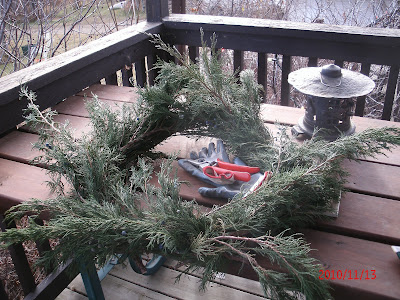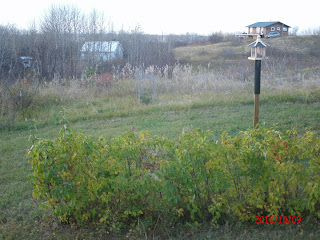2010 Christmas tree
Our living room recently welcomed a new addition, a thick, beautiful 6 foot balsam tree which we bought at the boy scout lot in town. Many people have turned to artificial trees over the years, but they never appealed to me. People have asked me why I cut down real trees when I profess to be such a nature buff. I do love trees and appreciate all their beauty and functions in providing shade, wood and especially their important role in the cycle of life on this planet: providing oxygen. On the other hand trees are a renewable resource. The trees in the Christmas tree lots are grown on tree farms specifically to be cut down at Christmas. No one is clearing existing forests or anything radical like that to provide Christmas trees. If everyone only bought artificial trees, the tree farms would have to stop planting and growing their tree, which would reduce the amount of oxygen produced on the planet, since these trees also produce oxygen in the time it takes them to grow big enough to sell.
And after Christmas, if you dispose of a real tree properly, use it as mulch if possible, it eventually goes back to the earth as compost, creating new soil. An artificial tree provides nothing... except of course a nice place to hang your decorations while you pretend it's a tree! Plus it requires a place to store it , and the artificial trees that wear out, end up in the land fills as garbage...
Plus I like the idea of supporting the Boy Scouts association every Christmas with our tree purchase.
Poinsettias are another example of a plant that is grown specifically for Christmas time. I have bought 4 of those this year, one large red one, a medium sized pale reddish pink, and 2 small ones for several rooms of the house. I have an old poinsettia in my bedroom bow window from last year. It has nice looking green leaves on it, (some new growth), but most of the red brackts have long fallen off.
In the right conditions, it is possible to get the brackts to turn red again. They need to have long, cool nights and little daylight. They don't like too much artificial light, either. The gardening books will tell you to put your poinsettia in a dark cool closet for 16 hours a day and bring it out for 8 hours of daylight each day. And they admit that even under those circumstances, it might not turn red. Seems like a lot of work, so most people consider poinsettias 'throw away' plants. In my house, I don't throw away anything that's still growing reasonably well. (Unless it has a disease or insect infestation I can't get rid of!)
A few years ago when we were still living in northern Manitoba, I had a poinsettia from the previous Christmas on the cold window sill in the computer room between the curtain and the window, and it did turn red again, two years in a row!
My Christmas cactus is blooming now and has an abundance of big buds on it! It is looking quite gorgeous. I have had this Christmas cactus for many years and it often blooms again in the spring around Easter time as well, although not as profusely. The tiny one that I planted from a slip that fell off the big plant also grew buds, but my middle sized plant has none.
I think it had something to do with the location. The middle sized Christmas cactus was in the kitchen where it got a lot of artificial light and maybe too much water. I moved it to the cool bedroom bow window where the small Christmas cactus had been to encourage it to set some buds.
One trick that often works is to withhold water for a month or 6 weeks in October/ November which usually results in flower buds. Once you notice the tiny little budlets forming at the end of the stems, be sure to start watering your Christmas cactus again regularly. Then it's important not to let it dry out or the rest of the little flower buds will fall off.
So some gardening is still possible in the winter. :)


















































